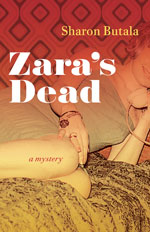
Acclaimed author, U of S alumna Sharon Butala publishes first mystery novel
In 1962, the body of 23-year-old Alexandra Wiwcharuk was discovered by a young boy who had wandered into some trees by the South Saskatchewan River.
By Shannon BoklaschukWiwcharuk, a Saskatoon nurse, had left her City Park apartment on May 18, 1962, to mail two letters at a nearby drugstore and to go for a walk. She was scheduled to work at City Hospital a few hours later and told her roommates she would return.
Tragically, she never did.
Wiwcharuk’s body was discovered in a shallow grave nearly two weeks later, near the intersection of Spadina Crescent and 33rdStreet. Police considered a number of suspects in the case, but, more than five decades later, answers continue to elude investigators.
Best-selling Canadian author and University of Saskatchewan alumna Sharon Butala (BEd’62, BA’63, PGD’73, DLitt’04) has had a longtime interest in the unsolved case. Butala went to high school with Wiwcharuk and published a nonfiction work about her killing in 2008. That book, The Girl in Saskatoon: A Meditation on Friendship, Memory and Murder, examined why the brutal slaying of Wiwcharuk continues to intrigue people to this day.
“I’ll try to put it in a nutshell: Because she was the descendant of a hard-working, never wealthy, quintessential Saskatchewan pioneer family, she stood for all of us and the hope our families had when they settled in Saskatchewan,” said Butala.
“Because she was a beautiful, unspoiled, good-natured, intelligent and ambitious young woman who might have gone far had she lived, she also represented the death of all our dreams. She was youth, beauty and innocence destroyed by wanton evil—that which we all fear. Saskatoon was a small place in the middle of nowhere and this extraordinary girl rose up in it, only to be killed for no reason at all. There is an echo from mythology here.”
Butala said Wiwcharuk was “a decent, intelligent young woman” and her death was “appalling and heartbreaking” for many. Because Butala and Wiwcharuk knew a number of the same people, and because Butala was living in Saskatoon when Wiwcharuk’s body was discovered, Butala naturally became very interested in the case.
“I wanted to write about the Saskatoon I knew, too, from 1953—when its population was about 50,000—to her death in 1962, when it was already 100,000. I wanted to try to figure out why her murder mattered so much to everyone, even 50 years later,” she said.

This month, Butala is launching a new book, Zara’s Dead, that was inspired by her experiences trying to tell the story of Wiwcharuk’s murder. Zara’s Dead is not intended to be a companion piece or a follow up-book to The Girl in Saskatoon; rather, Butala wrote the new book to stand alone as her first mystery novel.
“But anyone reading Zara's Dead is inevitably going to know I would never have even tried to write it if I hadn’t spent all those years trying to put together a narrative about what happened to Alex Wiwcharuk—and, even while I was gathering a mountain of information, I was also being thwarted at every turn, or given apparently important clues that I couldn’t understand,” said Butala.
“That is where I learned everything I know about what a writer is up against in trying to tell such a story—not to mention one heck of a lot about human nature that maybe I would be better off not knowing. But then, I wouldn’t be a writer.”
Butala, who was born in Nipawin, Sask., in 1940, has found great success as a prairie writer. She is a three-time Governor General’s Award nominee and an Officer of the Order of Canada. Her classic book, The Perfection of the Morning, was a No. 1 bestseller and a Governor General’s Award finalist, while her short story collection, Fever, won the 1992 Authors’ Award for Paperback Fiction and was shortlisted for the Commonwealth Writers’ Prize for best book (Canada and Caribbean region).
“I am inspired by the great beauty of the prairies: the vast sky, the distances that reach all the way to the horizon, their relative emptiness so that a person feels free on them,” said Butala. “One’s soul has room to expand. How very precious this place is.”
Butala’s 2015 novel, Wild Rose, was shortlisted for the W.O. Mitchell Book Prize, while Where I Live Now: A Journey Through Love and Loss to Healing and Hope was a 2017 Governor General’s Award nominee in nonfiction. Butala wrote the memoir Where I live Now when the life she had known for 33 years living on a southwest Saskatchewan ranch came to an end with the death of her beloved husband.
Butala also received the Saskatchewan Order of Merit in 2009 and the Cheryl and Henry Kloppenburg Award for Literary Excellence in 2012. The University of Saskatchewan bestowed Butala with an honorary degree in 2004 and the College of Arts and Science named Butala as one of its first 100 Alumni of Influence in 2009.
Butala looks back on her time at the U of S with fondness.
“I will never forget my English lit classes and professors at U of S: Professor Smith, who taught Shakespeare, Professor Carlyle King and modern American literature and others who in brief moments, which they would never even remember, they gave me glimpses into the power and beauty of literature,” she said.
Butala now lives in Calgary, but she will be heading to Saskatoon soon for her book launch on May 24 at McNally Robinson Booksellers. During the event, which will start at 7 p.m., Butala will discuss Zara’s Dead and sign copies of her new work.
Fittingly, she is also returning to the home of Alexandra Wiwcharuk to talk about the new mystery novel almost exactly 56 years after Wiwcharuk died.
“I wouldn’t characterize Zara’s Dead as a fictional telling of the murder of Alexandra Wiwcharuk. It isn’t a re-telling of that murder at all. This is more a book inspired by my experiences in trying to tell the story of that murder, and, as you know, that murder has never been solved and I wanted to write a mystery where I actually got to solve a murder,” said Butala.
“I also wanted to write about the frustrations of the ‘sleuth’—which I’m not and never have been—and I wanted to talk about how people hug secrets to themselves in such cases, how a so-called ‘sleuth’ angers people and suffers from it without ever knowing where the anger is coming from or precisely why it even exists, and also about the secrets a ‘sleuth’ stumbles on and doesn’t know what to do with.
“I had a head full of situations and experiences and knowledge I couldn’t use that fascinated me and I wanted to put them into a book. So I created a whole new raft of characters and a different situation, and then I invented solutions to my murder and chose the one I would go with. I’m not sure now that I picked the right ending out of the ones I thought up, but I guess it’s too late now to fix that.”
For more information about Butala, go online to sharonbutala.com. For more information about the May 24 event, go online to mcnallyrobinson.com.
Shannon Boklaschuk is a communications co-ordinator in the College of Arts and Science at the University of Saskatchewan.

